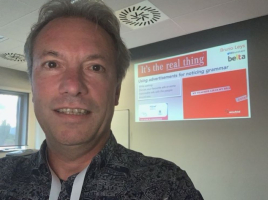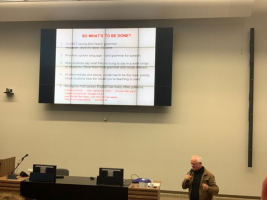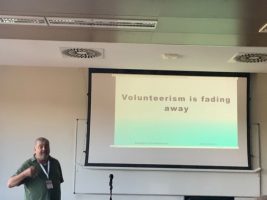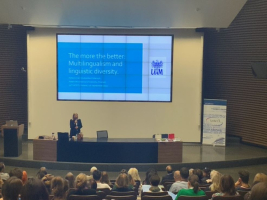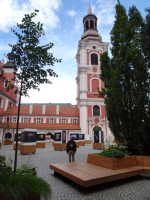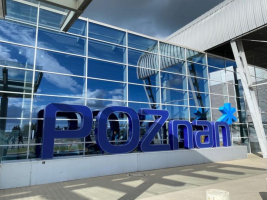- Home
- Attending the 31st IATEFL Poland Conference
Attending the 31st IATEFL Poland Conference
09/10/2022 - 16:04
Bruno Leys attended the 31st IATEFL Poland Conference in Poznań, Poland, and wrote a blog post about his experience for the BELTA Blog.
For many years, BELTA has been a partner of IATEFL Poland, our Polish counterpart. This partnership involves an exchange of speakers to our respective conferences.
BELTA Day attendees will definitely remember our Polish guests, who presented at many BELTA Days.
In exchange BELTA has been sending speakers to the annual IATEFL Poland Conference.
This year, the three-day event, which was attended by some 500 delegates, took place from 16-18 September in Poznań.
BELTA member and speaker Bruno Leys travelled to Poland to attend and give a talk at the 31st IATEFL Poland Conference,
Thank you, Bruno!
IATEFL Poland 16-18 September 2022
by Bruno Leys
Right after my talk at the IATEFL conference in Belfast, I was approached by a board member of IATEFL Poland, wondering if I could also present this topic at their annual conference. The request was alluring and thanks to BELTA’s partnership with IATEFL Poland and Hogeschool VIVES, I was able to travel to the beautiful, historical city of Poznan.
The conference is linked to the National Finals of the Polish Public Speaking Contest, which took place right before the opening ceremony and the winners received their awards during that ceremony. IATEFL Poland starts on Friday noon and lasts until Sunday 3 pm.
The opening ceremony and plenary did not really attract a crowd, but I can imagine that a lot of delegates were still teaching or on their way to the conference.
The opening plenary The more the better: Multilingualism and linguistic diversity was given by Katarzyny Dziubalskiej-Kolaczyc from the linguistic department of the University of Poznan. She dealt with endangered languages, L1 acquisition, SLA & TLA (Second & Third Language acquisition), bilingualism and multilingualism. An interesting fact I learned here was that 83% of the world’s languages are just spoken in one country.
The next talk I attended had the slightly thought-provoking title The Unholy Grail: Debunking Learner Centredness and was delivered by what seemed to be a kind of local ELT-hero, Pjotr Steinbrich. What he proposed was putting learning-centredness above learner-centredness.
A quite remarkable concept at the conference was that some of the sessions were live lessons with teenagers and young learners, where procedures were showcased. I attended Anna Rattenbury‘s session Musical Babies. I’m not sure how the children felt about this, but the whole thing had a bit of an awkward feel to me.
Rob Howard, a familiar name for many senior BELTA-members, talked about the future for teacher associations. These associations seem to be struggling with similar issues worldwide, with dwindling attendee numbers and the widely available alternative of free online webinars. His conclusion was that teacher associations need to focus on these elements: attract young teachers, be affordable, relevant and tech-ready for young teachers.
I closed day 1 with the highly entertaining Hugh Dellar (former BELTA day plenary speaker) on What is grammar really for?, who, as usual, was promoting a more lexical approach to grammar teaching.
On Saturday, I especially appreciated the sessions by Susan Holden (Coursebook contents should be relevant for the diverse group of learners around the world), Jerome Washington (So you want me to read a book? on stimulating learners’ interest for reading. Refreshingly without a PowerPoint and delivered with a load of enthusiasm) and Anna Kamont (a very practical session on brain-friendly activities). At 5.30 pm I gave my session (It’s the real thing! Using advertisements for noticing grammar) for a nice crowd of enthusiastic and engaged teachers.
On Sunday I attended sessions on level differences in advanced classes, using images in ELT and one on bringing art into the language classroom.
I couldn’t attend the Closing Ceremony as I had to catch my plane to fly back home. I had to teach a class at 8.30 am on Monday.
A few closing thoughts:
-
Poznan is a beautiful city, well worth a visit.
-
IATEFL Poland is a well-organised conference with a good mix of local and international speakers.
-
Believe it or not, but I did not drink a single glass of vodka during my stay in Poland.
-
Polish teachers have an excellent level of English, but above all, are open, warm, and kind people.
Thanks to BELTA, IATEFL Poland and Hogeschool VIVES for making this possible.
Biography
Bruno Leys has been an English teacher and teacher trainer for over 25 years. He currently works at VIVES University of Applied Sciences in Brugge.
He has published several EFL coursebook series: Breakaway, Takeaway, High Five and Fastbreak. He also writes articles, tweets and blogs about TEFL, provides in-service training sessions and is a speaker on conferences in Belgium and abroad.

